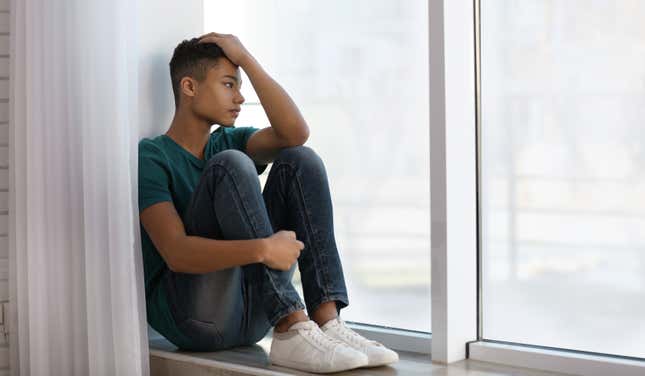
“I can’t go home. I can’t go back there,” they stated emphatically, taking breaths between each word. “If I am forced to go home I may die, literally,” a mentee said to me in tears over the phone.
They had received notification that they would be forced to vacate their college dormitory within 72 hours, concerned about their safety in ways that had little to do with contracting the coronavirus.
For many students, education is not simply a pathway to unlock the door to the American Dream. School provides a safe space where young people can escape the stress and pressures they may face at home and in their communities. Across the country, elementary, middle and high schools have been closed and forced to switch to online learning—a process that has revealed enduring gaps in access to technology and broadband. College and university students have been evicted en masse from following campus closures, often with barely any warning. The lives of students have been shifted, in significant ways, and many of them were sent away, presuming they had housing security, without the opportunity to say goodbye to friends, without knowing what would happen to their classes, without defending theses or hosting senior showcases or walking the stage at graduation.
Many students who are LGBTQ or same-gender-loving, and especially students who are black and LGBTQ+, are experiencing this transition in profoundly unique ways. For black students who identify as or are even just perceived to be LGBTQ+, being stuck at home can mean being unable to escape spaces that are harmful mentally, physically and spiritually. Many students use their time outside of the home to explore how they express their gender and sexuality in ways that may not be possible at home. At school, they are free to develop a broader, more diverse support system and imagine entire other ways of being. But being suddenly forced to leave your community and isolate in unsafe and unsupportive environments can be detrimental.
These concerns are not hypothetical. The Trevor Project has reported that since the outbreak began, calls to their suicide prevention hotline have already doubled. This increase follows spikes observed following the 2016 election. Black students are especially at risk. Many live in the South, where there are already fewer protections for LGBTQ+ people. When you live in a state that refuses to recognize who you are and how you show up in the world, it only intensifies feelings of isolation that come from necessary social distancing.
Additionally, in the last decade, there has been an alarming increase in suicide among black students. The National Black Justice Coalition (NBJC) contributed to a congressional report, “Ring the Alarm: The Crisis of Black Youth Suicide in America,” highlighting the particular danger of suicide amongst black youth. The report found that the suicide death rate for black youth had almost doubled between 2007 and 2017. And black youth under 13 were twice as likely to die by suicide compared to their white peers. Many victims died by suicide after experiencing bullying for being perceived to be gay. These statistics sometimes obscure the children, youth, and young adults they represent: students like Nigel Shelby, who died by suicide last year after constant homophobic bullying in school; or Jo’Vianni “Jo” Smith, who, also at 15, died by suicide at her home earlier this month while struggling to cope with the pressure of stay-at-home orders.
We are facing both a national health crisis and a national economic crisis. We must also be prepared to respond to the third crisis: an inevitable mental health disaster. We must all work to ensure that parents, families, and our communities are equipped to support our young people through the current crisis. We must quickly develop new competencies to nurture the learning and development of our children and to demonstrate compassion for the members of our community who have been too frequently neglected and abused. Luckily for caring and concerned adults, there are sources of support.
Level Up your understanding of the issues by reading the congressional report, as well as the NBJC’s LGBTQ terminology guide before you leverage the power of Google to increase your black LGBTQ/SGL IQ.
Use Existing Tools like the plethora of books, podcasts, and movies out there. Check out some of the recommended resources from the NBJC’s Quarantine and Chill IQ Booster, RSVP for NBJC’s Believing In Brilliance virtual discussion series, and follow @NBJCOnTheMove across digital platforms for more.
Phone a friend and get support from the numerous organizations out there, including the NBJC, that want to support you as you learn and grow. We all need support when we have questions, so if you’re musically inclined, check out these lessons drawn from Lil Nas X. If you’re interested in research, we have a webinar produced with GLSEN and a report from the Human Rights Campaign. If you need direct crisis intervention, reach out to the Trevor Project.
Black queer youth have found ways to thrive like never before. We see this in Zaya Wade, Amandla Stenberg, Willow Smith, and countless others. But as the adults responsible for our youth, we cannot take this for granted. What are we going to do?
I am thankful that my mentee was able to shelter in place with a friend from school. They are blessed with the privilege of having developed a network of support that includes financial privilege and the luxury of extra space; however, this is not the reality for so many young people who have no choice but to shelter in unsafe spaces. If you are or know someone who needs support in developing the language and adopting behaviors to ensure that all black children, youth, and young adults are able to be, consider NBJC a resource.

